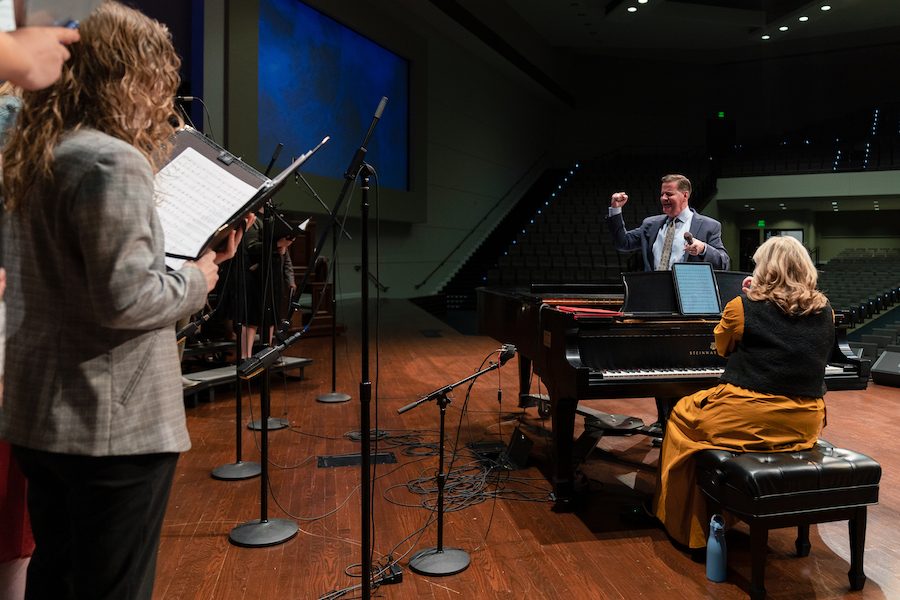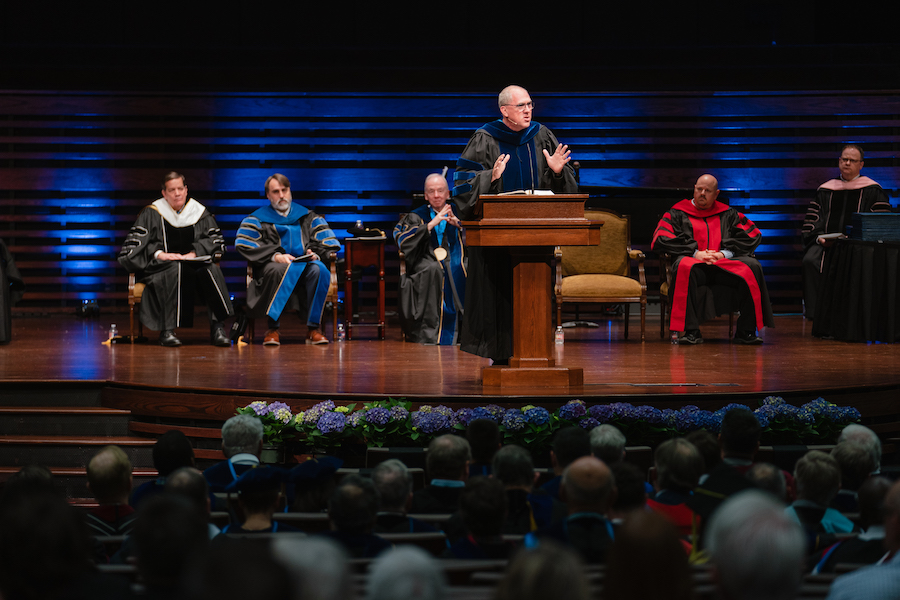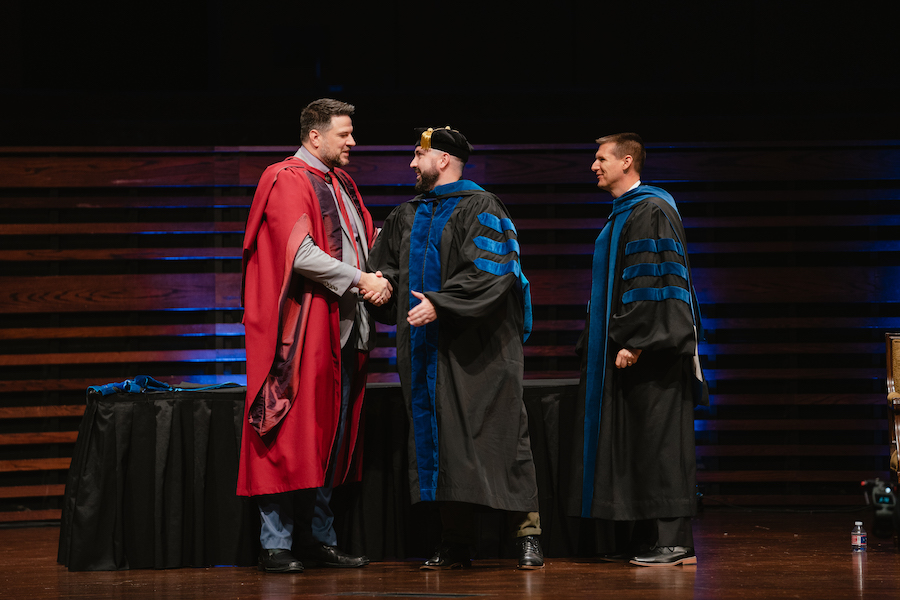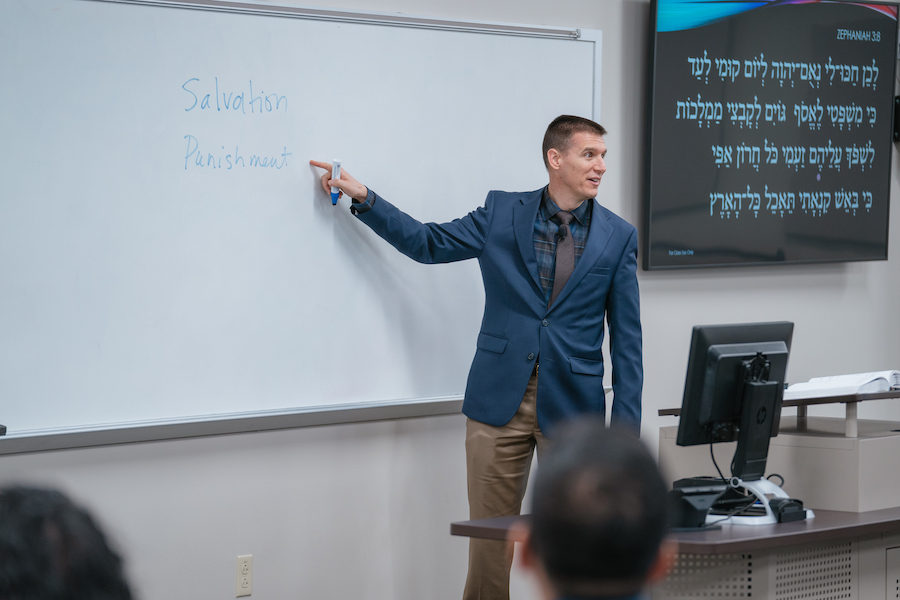SWBTS Legacy: W.T. Conner
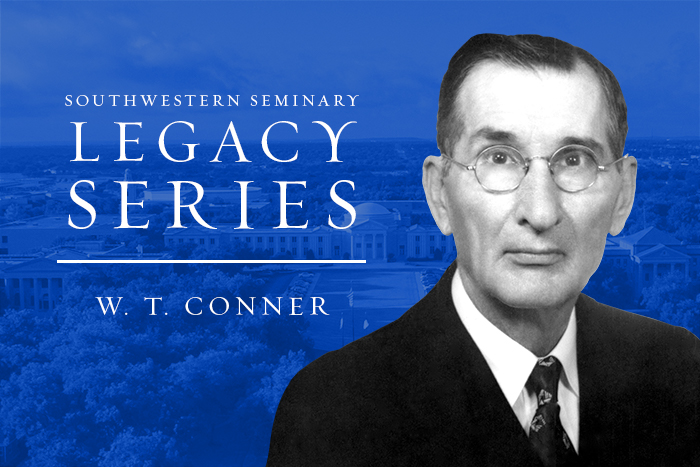

W.T. Conner, a founding professor of Southwestern Baptist Theological Seminary, is still recognized as one of Baptist history’s truly great theologians. His enduring legacy to Southern Baptist life lies in his 39-year teaching career at Southwestern Seminary, always regarding theology with a down-to-earth view and a straightforward path to acceptance of Christ.
“In the classroom, he endeavored to make theology practical rather than speculative,” historian Stephen M. Stookey writes in Conner’s profile for the Texas State Historical Association. “In the faculty, his recommendations for prospective teachers were tantamount to administrative approval.”
Conner distinguished himself as the preeminent Southern Baptist theologian during the 1930s and 1940s. “He was at home among both laymen and scholars,” Stookey writes. “His lectures and books were written with the layman in mind, but they display an underlying academic depth and extensive knowledge of his field.”
Conner’s practical view of theology shaped literally thousands of preachers, missionaries, and teachers around the world, who still recalled his influence years after his death.
Walter Thomas Conner was born at Center (now Rowell), Ark., in 1877, the son of Philip Orlander and Frances Jane Monk Conner. The family moved to the West Texas community of Tebo (now Tye), eight miles west of Abilene, when he was 15.
Because of restricted finances, Conner’s attendance at the academy of Simmons College (now Hardin-Simmons University) and Baylor University was intermittent. He received an A.B. degree from Baylor in 1906. In 1907, he married Blanche Horne, a Baylor University classmate. Then, in 1908, he received both a Th.B. from Baylor Theological Seminary (which chartered in March 1908 as Southwestern Baptist Theological Seminary) and an A.M. degree from Baylor University.
In order to prepare for a teaching post at Southwestern Seminary, Conner enrolled at Rochester Theological Seminary in 1908, then received a B.D. degree there in 1910. That year, he began teaching systematic theology at Southwestern Seminary, when the school moved from Waco to Fort Worth.
Conner later studied at the University of Chicago and Southern Baptist Theological Seminary in Louisville, Ky., where he received his Th.D. degree in 1916, writing his thesis on “Pragmatism and Theology”—turning his focus to practical theology and logic. Baylor University awarded Conner an honorary D.D. degree in 1920. Then, when Southern Seminary began to award the Ph.D. degree instead of the Th.D., Conner availed himself of the opportunity of upgrading his Th.D. to Ph.D. status with an additional thesis on the topic “The Idea of Incarnation in the Gospel of John” in 1931.
Conner was the first pastor of Seminary Hill Baptist Church (now Gambrell Street Baptist Church) in Fort Worth, and pastored Baptist churches at Eagle Lake, Rock Island, East Bernard, Blum, Rio Vista, Godley, and Handley. While a student at Rochester, he served as pastor of the Baptist church in Wheatville, N.Y.
“His theology reflects the influence of three former professors: Benajah H. Carroll of Baylor, A.H. Strong of Rochester, and E.Y. Mullins of Louisville,” Stookey writes. But Conner’s theology displayed his own acumen. “His theological works reflect a biblical rather than systematic approach.”
Applying his practical view to theology, Conner believed that there are three conditions without which there can be no union of God’s people in the world: spiritual unity, or the brotherhood of Christian believers (“Men can never get together in spiritual unity until they get together in Christ,” he wrote in 1923); doctrinal unity (“on the great fundamental doctrines of Christianity there must be agreement”); and the organization of the church and the ordinances of baptism and the Lord’s Supper.
“Every time a penitent sinner goes down into the water to be baptized, he is preaching the Gospel of salvation through a crucified and risen Redeemer,” Conner wrote. “He thereby confesses himself a sinner and Christ as his Savior. Therefore, the form of baptism is important.”
“Somebody says it is only a form, so why stickle for a form?” he continued. “It is a form, but we must remember that it is a form with a meaning, and the meaning lies in the form. Therefore, if the form be changed, the meaning is destroyed. There is no Christian baptism then apart from immersion, which pictures a burial and a resurrection.”
In Conner’s final years of teaching, he developed an increasing interest in the spiritual side of the Christian faith. “Some of us can recall in those last months that he expressed repeatedly some remarkable insights of an intense devotion personally to Jesus as Lord and Savior,” writes Darold Morgan, a former student of Conner’s who later served as executive director of the Southern Baptist Annuity Board.
“For these months, we studied some of the masterpieces of Christian devotional material,” Morgan writes. “What a joy even today to recall listening both to the other students in the seminar and to Dr. Conner as he made such insightful comments on the material.”
Conner’s last year of teaching was 1949, when a debilitating stroke ended his extraordinary ministry of lecturing, writing, and preaching. “I had the unique privilege of being in his last group of doctoral students, and can recall to this day the shock that followed the announcement of his stroke, which ended his active involvement at Southwestern,” Morgan says.
Conner lived for three years after his stroke, limited to a wheelchair and his bed. Morgan recalls that a report circulated around the campus that Conner had repeatedly asked his wife, “Why did God leave me like this?” One day, she responded, “Perhaps He left you this way so you could catch up on your praying.”
“Later, as she checked on him in the late night hours, she could tell he was awake, despite his eyes being closed,” Morgan recalls. “His lips were moving in prayer, and she saw tears on his face as he was in prayer and worship, as always taking a straightforward path to commune with Christ.”
“Over these 50-plus years in my own pilgrimage since those distant days at Southwestern,” Morgan says, “I have heard preachers and teachers and others in numberless settings of seminaries, conventions, and worship services. But I have never been as moved as I was so many times in Dr. Conner’s classes. Although his lectures and prayers were usually monotone, when he shifted gears into the excitement of a particular truth, he was for me beyond Moses and Elijah.”
Conner died in 1952 and is buried in Fort Worth. Morgan recalls of his former professor: “There were moments when his eloquence was so overpowering, his logic so forceful, his devotion to Christ so apparent that the force of those moments are still alive and dynamic in me.”
